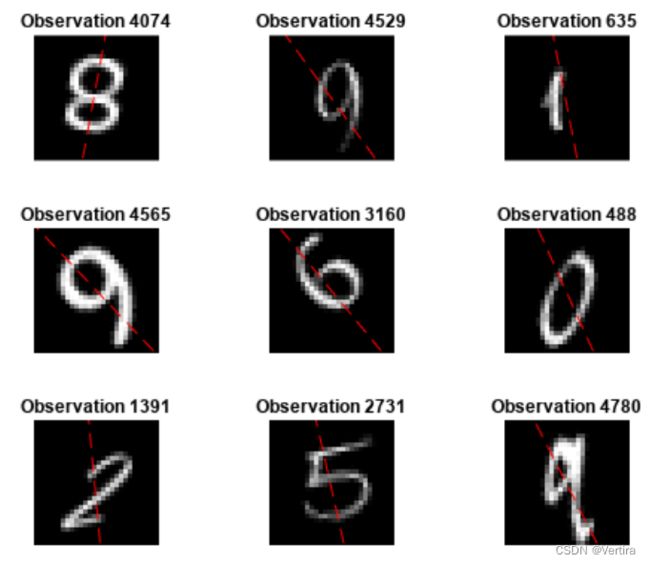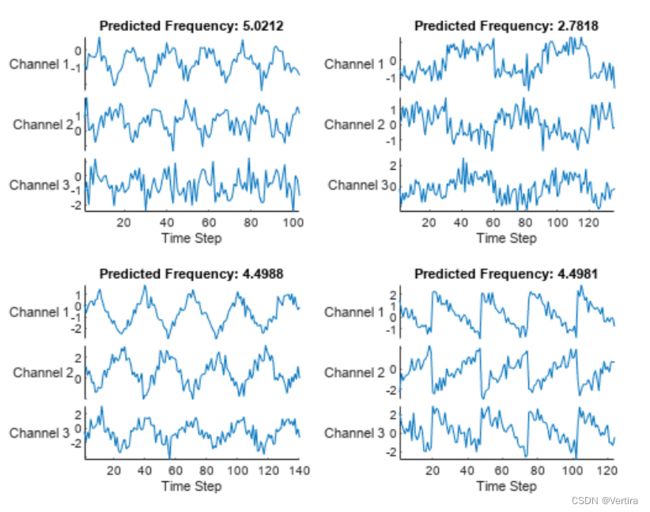matlab 2022a predict()函数的使用方法--深度学习
predict
使用训练过的深度学习神经网络预测响应.
Syntax
Y = predict(net,images)
Y = predict(net,sequences)
Y = predict(net,features)
Y = predict(net,X1,...,XN)
Y = predict(net,mixed)
[Y1,...,YM] = predict(___)
___ = predict(___,Name=Value)
描述
你可以在CPU或GPU上使用经过训练的深度学习神经网络进行预测。使用GPU需要并行计算工具箱™和支持的GPU设备。有关支持的设备的信息,请参见GPU计算要求(并行计算工具箱)。使用ExecutionEnvironment名称-值参数指定硬件需求。
使用此函数可以使用经过训练的SeriesNetwork或DAGNetwork对象预测响应。有关使用dlnetwork对象预测响应的信息,请参见predict。
Y = predict(net,images) predicts the responses of the specified images using the trained network net.
example
Y = predict(net,sequences) predicts the responses of the specified sequences using the trained network net.
Y = predict(net,features) predicts the responses of the specified feature data using the trained network net.
Y = predict(net,X1,...,XN) predicts the responses for the data in the numeric or cell arrays X1, …, XN for the multi-input network net. The input Xi corresponds to the network input net.InputNames(i).
Y = predict(net,mixed) predicts the responses using the trained network net with multiple inputs of mixed data types.[Y1…,YM] = predict(___)使用前面的任何输入参数预测多输出网络的M个输出的响应。输出Yj对应于网络输出net.OutputNames(j)。要为分类输出层返回分类输出,请将ReturnCategorical选项设置为1 (true)。
___ = predict(___,Name=Value) predicts the responses with additional options specified by one or more name-value arguments.
例子:
使用训练过的卷积神经网络预测数字响应
加载预先训练的网络digitsRegressionNet。该网络是一种预测手写体数字旋转角度的回归卷积神经网络。
load digitsRegressionNet查看网络层次。网络的输出层是一个回归层。
layers = net.Layers输出结果:
layers =
18x1 Layer array with layers:
1 'imageinput' Image Input 28x28x1 images with 'zerocenter' normalization
2 'conv_1' 2-D Convolution 8 3x3x1 convolutions with stride [1 1] and padding 'same'
3 'batchnorm_1' Batch Normalization Batch normalization with 8 channels
4 'relu_1' ReLU ReLU
5 'avgpool2d_1' 2-D Average Pooling 2x2 average pooling with stride [2 2] and padding [0 0 0 0]
6 'conv_2' 2-D Convolution 16 3x3x8 convolutions with stride [1 1] and padding 'same'
7 'batchnorm_2' Batch Normalization Batch normalization with 16 channels
8 'relu_2' ReLU ReLU
9 'avgpool2d_2' 2-D Average Pooling 2x2 average pooling with stride [2 2] and padding [0 0 0 0]
10 'conv_3' 2-D Convolution 32 3x3x16 convolutions with stride [1 1] and padding 'same'
11 'batchnorm_3' Batch Normalization Batch normalization with 32 channels
12 'relu_3' ReLU ReLU
13 'conv_4' 2-D Convolution 32 3x3x32 convolutions with stride [1 1] and padding 'same'
14 'batchnorm_4' Batch Normalization Batch normalization with 32 channels
15 'relu_4' ReLU ReLU
16 'dropout' Dropout 20% dropout
17 'fc' Fully Connected 1 fully connected layer
18 'regressionoutput' Regression Output mean-squared-error with response 'Response'加载测试图像。
XTest = digitTest4DArrayData;利用预测函数预测输入数据的响应。
YTest = predict(net,XTest);随机查看一些测试图像及其预测。
numPlots = 9;
idx = randperm(size(XTest,4),numPlots);
sz = size(XTest,1);
offset = sz/2;
figure
tiledlayout("flow")
for i = 1:numPlots
nexttile
imshow(XTest(:,:,:,idx(i)))
title("Observation " + idx(i))
hold on
plot(offset*[1-tand(YTest(idx(i))) 1+tand(YTest(idx(i)))],[sz 0],"r--")
hold off
end利用训练过的LSTM网络预测序列的数值响应
加载预训练的网络freqNet。该网络是一个预测波形频率的LSTM回归神经网络。
load freqNet查看网络层次。网络的输出层是一个回归层。
net.Layersans =
4x1 Layer array with layers:
1 'sequenceinput' Sequence Input Sequence input with 3 dimensions
2 'lstm' LSTM LSTM with 100 hidden units
3 'fc' Fully Connected 1 fully connected layer
4 'regressionoutput' Regression Output mean-squared-error with response 'Response'加载测试序列。
load WaveformData
X = data;利用预测函数预测输入数据的响应。因为网络是使用截断到每个小批的最短序列长度的序列进行训练的,所以也可以通过将SequenceLength选项设置为“最短”来截断测试序列。
Y = predict(net,X,SequenceLength="shortest");在一个图中想象最初的几个预测。
figure
tiledlayout(2,2)
for i = 1:4
nexttile
stackedplot(X{i}',DisplayLabels="Channel " + (1:3))
xlabel("Time Step")
title("Predicted Frequency: " + string(Y(i)))
end
Predict responses using trained deep learning neural network - MATLAB predict - MathWorks 中国

